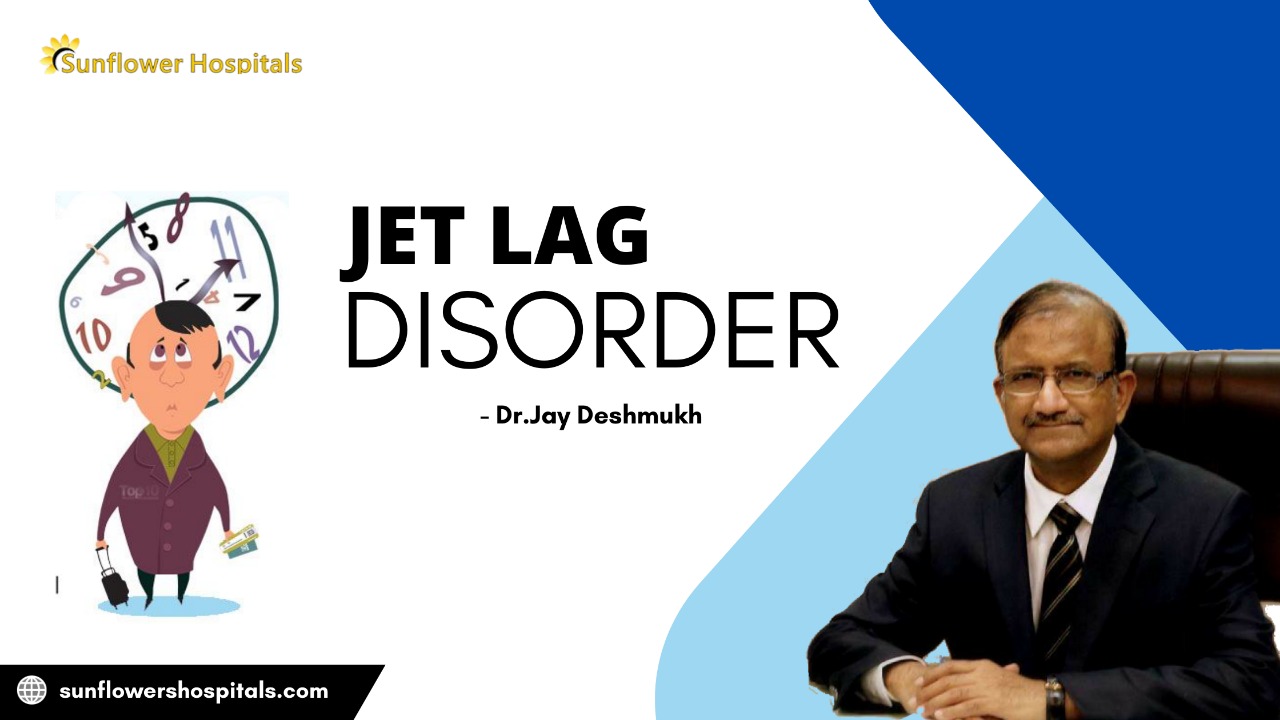Dr Jay Deshmukh MD, FCPS, MNAMS
Jet lag is a temporary sleep disorder that can affect you if you quickly travel across multiple time zones. Jet lag occurs as your body’s clock continues to be synchronized to your original time zone, in place of your destination. The more time zones crossed, the more likely that you shall experience jet lag.
What can jet lag do to you?
Jet lag can cause daytime fatigue. You may not feel well most of the time. Difficulty in staying alert and some symptoms like nausea, constipation, or stomachache or upsets are common. This is temporary the symptoms generally become less over a month. However, it can reduce your pleasure of traveling for vacation, studies, or business.
What are the symptoms of lag?
You can have only one symptom or may have many! Every individual may have a different form of presentation. Jet lag symptoms may include disturbed sleep such as sleep deprivation, early waking, or excessive sleepiness. Day time fatigue. The inability to concentrate or function adequately is common. Mood changes and a general feeling of not being well are common.
What are the risk actors that may increase your chances of having a jet lag disorder?
Factors that may increase the likelihood of jet lag include the number of time zones you cross. The more time zones that you cross the more chances of you having symptoms of jet lag. One finds it harder to travel to the East when you lose tune than to fly West when you gain time. Frequent flyers like pilots, flight attendants, and business travelers are most likely to have jet lag. Older adults need more time to recover from jet lag then younger people.
Which is the most important complication for jet lag victims?
Emotional lability can result in most embarrass-ing events for which you can be easily misunderstood. Driving in a drowsy state may cause accidents.
How does jet lag occur?
Traveling through different time zones results in our biological clock getting unbalanced. Our body works on 24-hour circadian rhythms. These rhythms are measured by the distinct rise and fall of body temperature, plasma levels of certain hormones, and other biological conditions.
All of these are influenced by our exposure to sunlight and help us to determine when we should sleep and when to remain awake. When traveling to a new time zone, our circadian rhythms are slow to adjust and remain in their original biological schedule for several days. This results in our bodies telling us it is time to sleep when it is actually the middle of the afternoon, or you tend to stay awake when it is late at night.
What are the ways to reduce jet lag?
Select a flight that arrives in India in the evening and stay awake till 10 pm. Please anticipate the time changes for trips by getting up and going to bed earlier several days prior to an eastward trip and later for a westward trip. Upon boarding the plane, change your watch time to your destination time. Avoid alcohol and caffeine at least three to four hours before bedtime. Both act as stimulants. Avoid heavy meals at your destination. Avoid heavy exercise near your bedtime. Have earplugs and blindfolds to dampen noise and light while you are sleeping.
How to cope up with jet lag disorder?
Please modify your behaw four. Taking sleeping pills when you reach your destination is acceptable. This minimizes certain sleep disorders. Certain changes in your travel schedule and routine can help your body adjust to new time zones and surroundings. Though sleep-inducing medications do not resolve biological imbalance caused by jet lag, they help you to over• come short term insomnia. Sleep inducing medications may have their own side effects.
What about Melatonin?
This is available without a prescription in many countries. Melatonin is a hormone secreted by the human brain and this hormone affects the bodies’ circadian rhythms. When Melatonin is given during the day, it increases the tendency to sleep at night. This hormone is receiving a lot of attention these days.
What is the advice for motivated people?
For motivated individuals’ treatment of jet lag is aimed at accelerating adjustment to the new time zones with strategically-timed bright light and Melatonin administration. This is in addition to symptomatic measures to mitigate symptoms of excessive daytime sleepiness and sleep deprivation. The expression that west is best and east is a beast is true when you travel to the east or west. Just relax your travel schedule.
Get a good night’s sleep before you fly. Avoid arriving at night. Be plane savvy and spot if your aircraft has a hi-tech humidification system along with LED lighting systems. If it is a long trip, better split it. Avoid alcohol at high altitudes for it increases tiredness and dehydration causing jet lag. Avoid sleeping pills in flight. Eat right, set your watch to your destination time and do light exercises in flight, or keep moving in flight. Always get good sleep the day before you travel. Do not forget to get adequate sun exposure when you reach your destination.
Author: Dr Jay Deshmukh
Dr Jay Deshmukh is Chief Physician and Director, Sunflower Hospital, Nagpur Honorary Physician to Honorable Governor of Maharashtra and PondicherryCentral. Dr Jay Deshmukh is an M.B.B.S., M.C.P.S., F.C.P.S., M.N.A.M.S., MD From Internal Medicine – Bombay and New Delhi.


